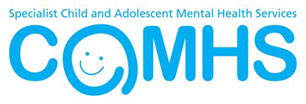All about CAMHS-ED
Here are some of the questions we often get asked about the CAMHS Eating Disorders Service, or CAMHS-ED...
We are a specialist service within CAMHS that accepts referrals for children and young people aged 0-18 with a range of eating disorders. We work closely with our colleagues in the Adult Eating Disorders Team to support a smooth transition, should your care continue beyond the age of 18. CAMHS stands for Child and Adolescent Mental Health Services.
Lots of children and young people go to CAMHS with a wide range of difficulties but those that come to the CAMHS Eating Disorder Service will have particular anxieties and other issues around eating and drinking. However, those that do experience an eating disorder are not alone, and there are professionals here to help resolve these issues.
An eating disorder is when someone behaves differently towards foods which can cause them to become upset and change the way and how much they eat. A person with an eating disorder may regularly think about their weight and shape (which may be distressing) and feel that they have to change the way they eat because they are upset or due to other reasons.
An eating disorder will often mean that someone will make unhealthy choices about food that can be unhelpful for their overall health. Examples of an eating disorder are as follows:
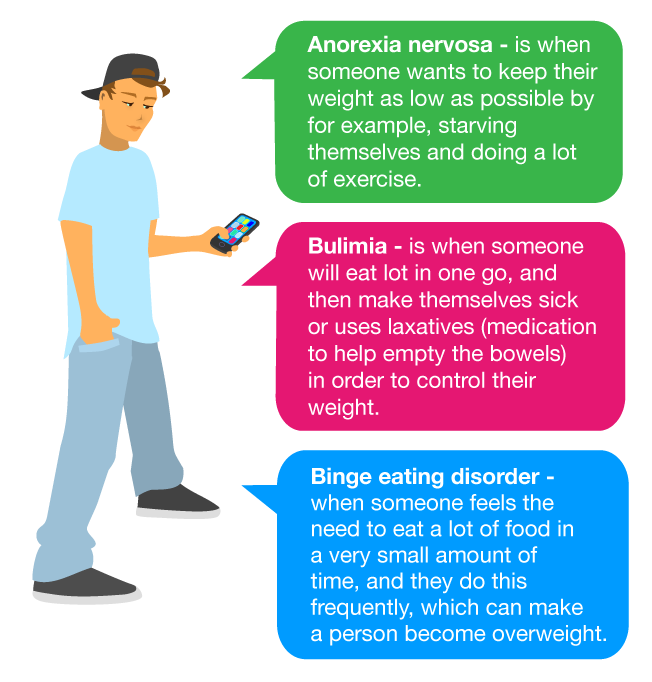
Anorexia nervosa is when someone wants to control what they are eating and lose weight. Losing weight might give them a sense of achievement. They may start to starve themselves and do a lot of exercise.
Bulimia is when someone will eat a lot in one go, and then make themselves sick or use laxatives (medication to help empty the bowels) in order to control their weight.
Binge eating disorder is when someone feels the need to eat a lot of food in a very small amount of time and they do this frequently, which can make a person become overweight.
The list of professionals who work within the CAMHS eating disorders service is similar to the CAMHS list and is likely to include:
- Doctors
- Dietitian
- Nurses
- Therapists
- Admin Support Staff
- Young Person Support Workers
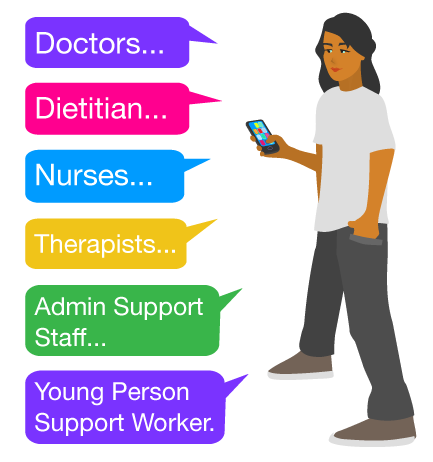
The Young Minds website does a good job of explaining what these different people do. Take a look!
Depending on your age, you may be seen with a parent or carer. We keep what you tell us confidential (private). The only time we would tell someone else, is if you have told us something that means you or someone else will be unsafe. If that is the case, we will talk to you about it first. This means you will know who we contact before we do it.
Sometimes we work alongside agencies such as First Steps, and if you agree to have their support (or you already do), we may share relevant information between our services.
We will often receive a referral from your GP, school nurse or other professional person and now we also accept self-referrals. One of the team will phone you to find out some more information and if it is agreed that our team is best suited to support you we will arrange an initial assessment appointment to learn more about you.
If you have any questions or concerns, we always have someone available on duty from Monday to Friday (9am - 5pm) who may be able to help, advise and talk to you. Please call us on 0300 7900264 and request to speak to the ED Duty Worker.
Our self-referral forms
Lots of children and young people feel worried before coming to CAMHS because it is something new. On your first appointment, we like to get to know you a little better and we will ask you some questions so we can do this. Some questions may include:
- Looking at aspects of your mental health and how you have been feeling
- Your physical health
- Your social and educational situation including your family and support networks
- How you developed as a child (parents or carers would be helpful for this)
-
Your eating habits/behaviours/thinking and how this affects your life
We will also ask you to fill in forms for information and questionnaires, which helps us understand the difficulties you have been having. You can ask us any questions you have too. We may also ask you to give some more information about your eating patterns and food intake and ask you to keep a food diary for a few days.
The videos on the First Appointment page have answers to some common questions you might have.
We will invite your parents/carers to be present during the initial appointment, so that we can get their views of your current difficulties as well as your own. We may then offer some time for you and your family to meet with us separately if it is felt this may be helpful.
To ensure your physical health is OK, we may ask your GP to arrange some further tests, which may include blood tests. During the assessment we will also check your weight and height and record your blood pressure and pulse.
It is up to you what you decide to share with us. We would hope you do not feel under pressure and we understand it can take time before you feel ready to talk. We will ask you questions such as 'how are things for you?' and 'how can we or others help you?'
Sometimes it can be useful to write any questions that you may have down on paper. We understand that people do sometimes feel nervous when speaking to someone they don’t know, and can forget what they wanted to ask.
Please help us to help you by giving us as much information as possible.
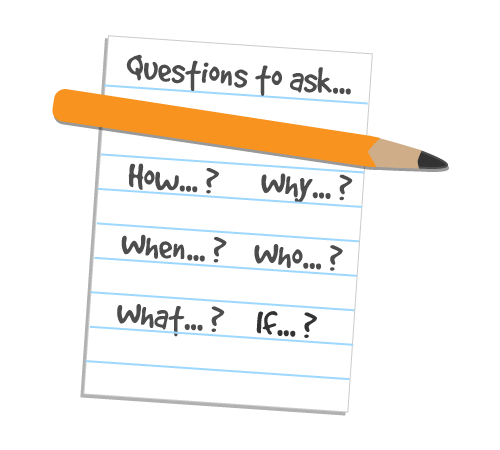
Growing up is not easy, and sometimes it's hard to cope with whatever life throws at you. We can help if you experience any of these problems with eating:
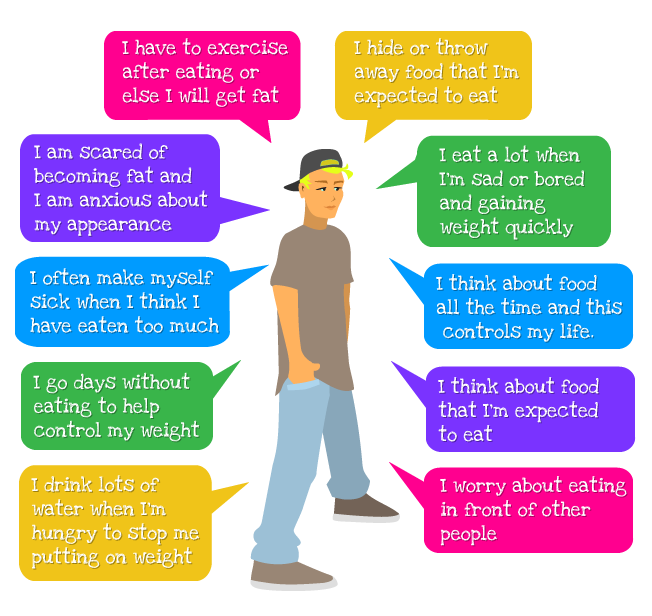
- I have to exercise after eating or else I will get fat.
- I hide or throw away food that I'm expected to eat.
- I am scared of becoming fat and I am anxious about my appearance.
- I eat a lot when I'm sad or bored and I am gaining weight quickly.
- I often make myself sick when I think I have eaten too much.
- I think about food all the time and this controls my life.
- I go days without eating to help control my weight.
- I think about food that I'm expected to eat.
- I drink lots of water when I'm hungry to stop me putting on weight.
- I worry about eating in front of other people.
If you have any concerns or want to speak to someone for advice please call Temple House via 0300 7900 264 and ask to speak to the Eating Disorders Duty Worker (Monday to Friday 9-5).
Our Need Help page also has information for other services and people you can contact including out of hours.
Other sources of information:
- Beat - a UK charity supporting those affected by eating disorders
- First Steps ED - an eating disorder charity supporting individuals impacted by eating difficulties and disorders throughout the UK, based locally in Derby
- Mind - a UK mental health charity whose website provides lots of information and support around different mental health difficulties including eating disorders
- YoungMinds - the UK's leading charity fighting for children and young people's mental health
- FREED Beeches - a free service for adults and adolescents aged 14 and over who are suffering from certain eating disorders.

